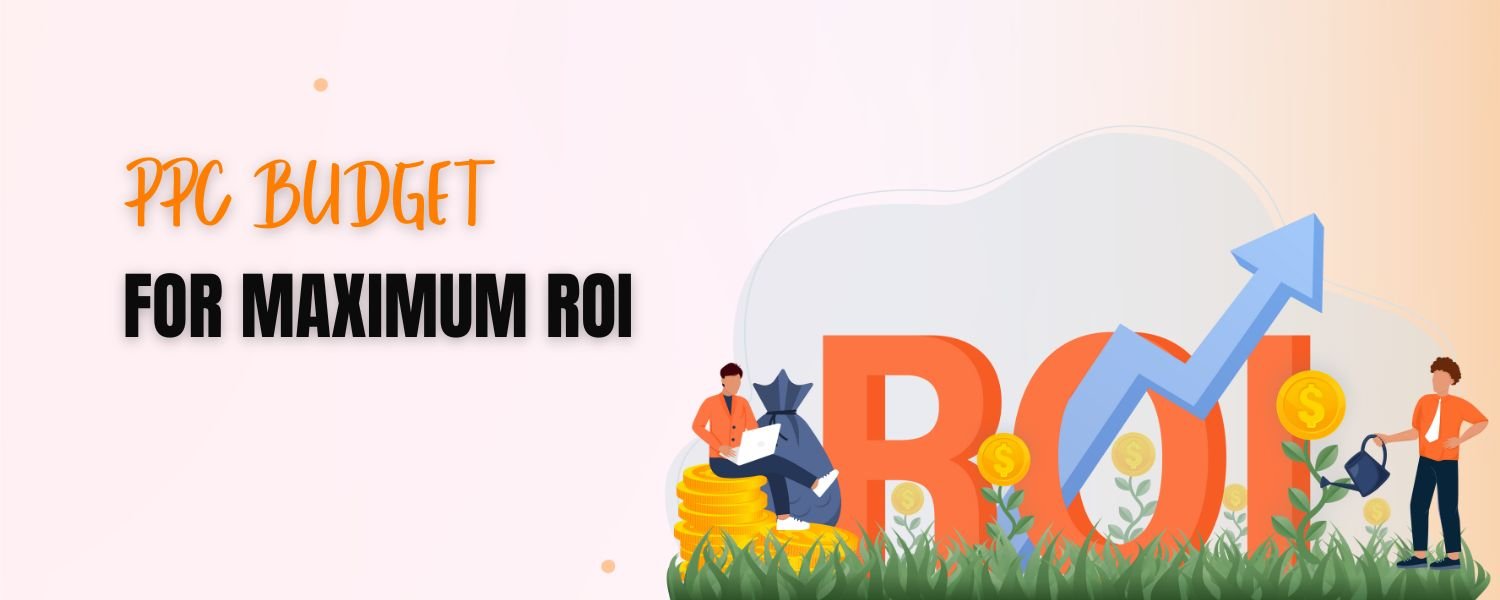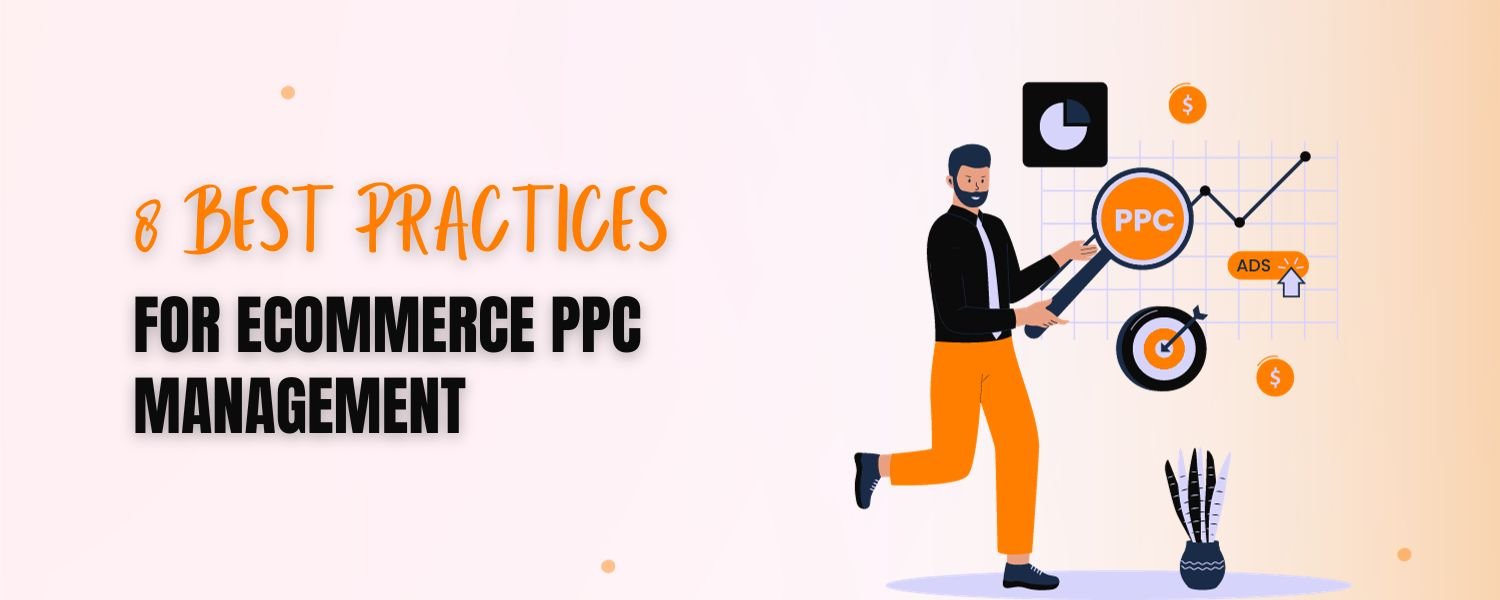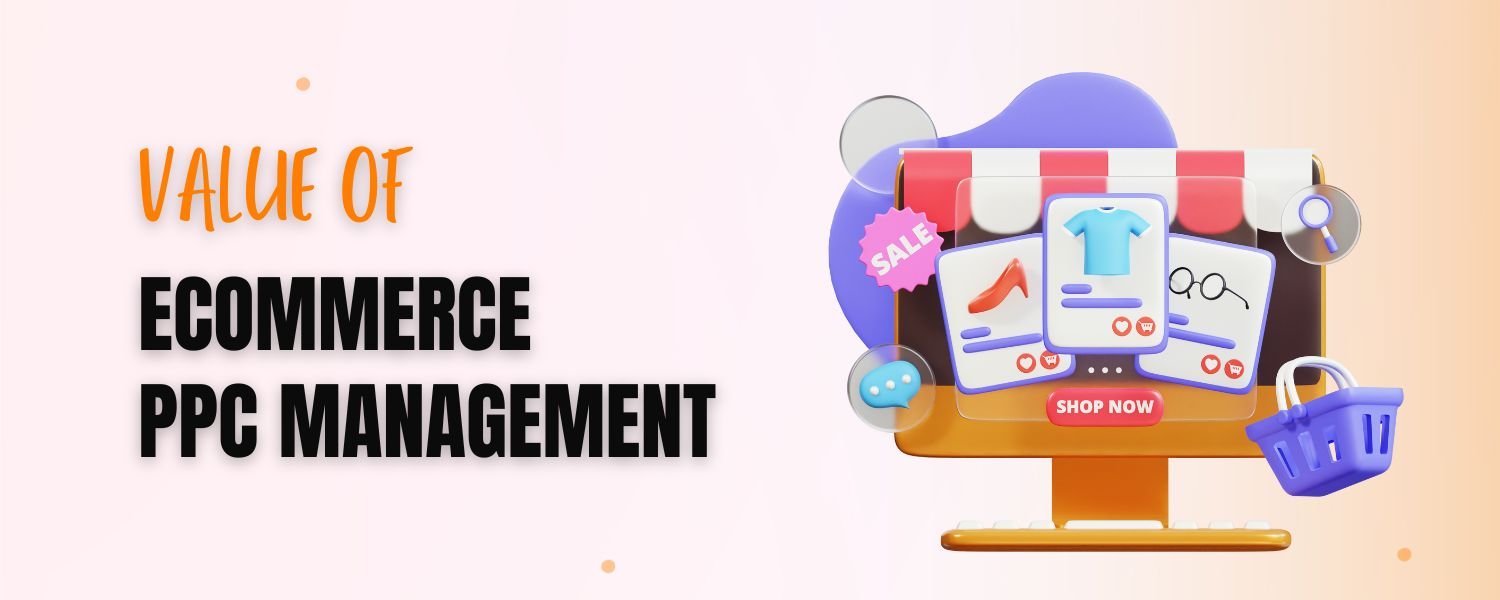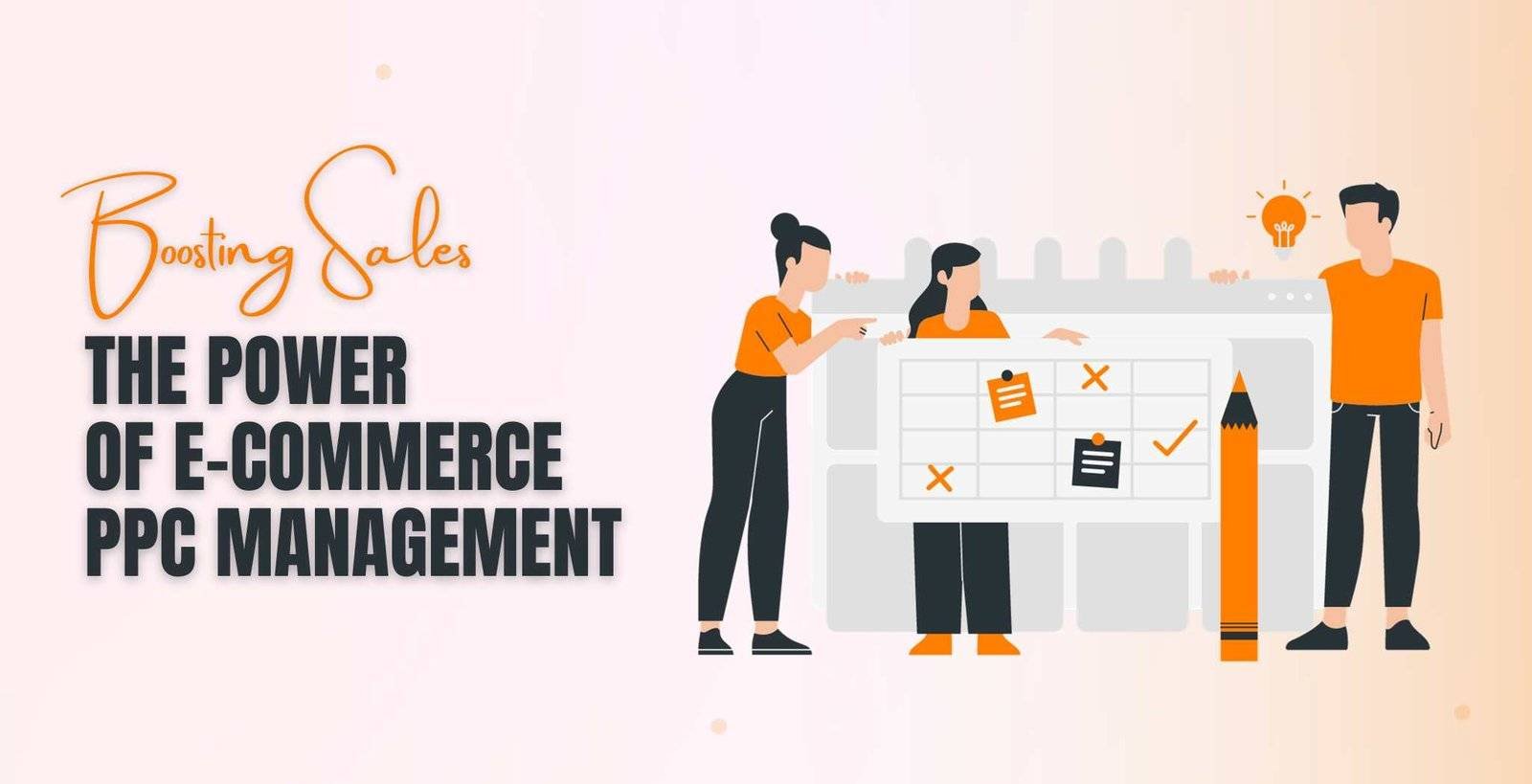Boosting Sales: The Power of E-commerce PPC Management
E-commerce thrives on visibility and strategic outreach, and at the heart of this success lies PPC (Pay-Per-Click) Management. Specially tailored for the online marketplace, E-commerce PPC Management is a powerful orchestrator of paid advertising, steering traffic and conversions for digital storefronts.
This strategic oversight involves a multi-layered approach—precision in keyword selection, crafting compelling ad creatives, and continuous bid and performance optimization. In this blog, we uncover the pivotal role of E-commerce PPC in driving sales, its indispensability for online businesses, and the value it brings, alongside exploring the benefits of hiring specialized management services and navigating the terrain of budget allocation for maximum ROI. Let’s unlock the secrets and strategies of this dynamic force shaping the digital marketplace.
What is PPC Management?

PPC (Pay-Per-Click) Management, especially in e-commerce, strategically handles and optimises paid advertising campaigns to drive traffic and conversions for online stores.
E-commerce PPC Management involves crafting and overseeing paid advertising initiatives on platforms like Google Ads, Bing Ads, or social media channels like Facebook, Instagram, and LinkedIn. The primary goal is to attract potential customers to e-commerce websites, entice them to click on the ads, and ultimately purchase.
This management process comprises several key elements:
1. Keyword Research and Selection
Identifying and targeting the most relevant and high-converting keywords related to the products or services offered. These keywords are crucial to determine when and where the ads will appear.
2. Ad Creation and Optimization
Crafting compelling, visually appealing ad copies and visuals that resonate with the target audience. Continuous testing and optimization of ad components like headlines, descriptions, and visuals are essential to improve performance.
3. Bid Management
Bidding on selected keywords in auctions to secure ad placement. Monitoring and adjusting bids based on performance data ensures cost efficiency and maximum exposure.
4. Landing Page Optimization
Ensuring that the destination pages linked to the ads are user-friendly, optimized for conversions, and aligned with the ad’s promise. A seamless transition from ad to landing page enhances the likelihood of conversions.
5. Performance Analysis and Reporting
Regularly track and analyze the performance metrics of the PPC campaigns. This includes click-through rates, conversion rates, return on ad spend (ROAS), and other key performance indicators. Insights from these analytics drive further refinements and strategy adjustments.
Why is PPC Marketing Essential for eCommerce?

E-commerce PPC management plays a crucial role in the success of online businesses. Pay-per-click (PPC) marketing is essential for e-commerce for several compelling reasons.
1. Targeted Reach
E-commerce PPC allows businesses to target specific audiences based on demographics, interests, location, and online behaviour. This precision targeting ensures that the ads reach the right people at the right time, increasing the likelihood of conversions.
2. Immediate Visibility
Unlike organic strategies that take time to rank, PPC campaigns offer immediate visibility. Once the campaign is live, ads appear on search engines or social media platforms, ensuring instant exposure to potential customers.
3. Cost-Effectiveness
PPC campaigns can be cost-effective if managed efficiently. With strategies like bidding on long-tail keywords or optimizing ad relevancy, businesses can maximize their ROI. Additionally, PPC platforms often allow setting daily or campaign budgets, ensuring control over expenditure.
4. Measurable Results
E-commerce PPC provides robust analytics and metrics, offering insights into ad performance. This data helps understand customer behaviour, determine which strategies work best, and optimise campaigns accordingly.
5. Enhanced Brand Awareness
Consistent visibility through PPC campaigns contributes to brand recognition. Even if users don’t immediately click on the ad, repeated exposure can lead to brand recall when they’re ready to purchase.
6. Adaptability and Flexibility
E-commerce PPC campaigns are highly adaptable. Ad content, budgets, and targeting criteria can be adjusted in real-time based on performance, market changes, or specific promotional needs, allowing for agility in marketing strategies.
7. Complements SEO Efforts
While SEO is crucial for organic traffic, PPC complements it effectively. It can fill gaps while waiting for SEO strategies to yield results, maintain visibility during algorithm changes, or target specific keywords that might be challenging to rank organically.
8. Competitive Edge
In the competitive e-commerce landscape, PPC can give businesses an edge. Smartly managed campaigns can help smaller or newer e-commerce ventures compete with larger, established brands by reaching potential customers effectively.
What are the Benefits of Hiring an eCommerce PPC Management Company?

Hiring an eCommerce PPC management company can bring many advantages to online businesses aiming to maximize their digital presence and revenue streams. Here’s a breakdown of the key benefits:
1. Expertise and Experience:
ECommerce PPC management companies specialize in online advertising. They bring in-depth knowledge and experience in navigating platforms like Google Ads, Bing Ads, and social media ad platforms. Their expertise ensures campaigns are optimized to reach the right audience, maximizing ROI.
2. Targeted Campaigns
These professionals understand the nuances of targeting specific demographics, locations, and interests. They can craft campaigns that reach the most relevant audience for your eCommerce store, leading to higher conversion rates.
3. Cost Efficiency
With their experience, PPC managers can optimize your ad spend, ensuring your budget is utilized effectively. They constantly monitor campaigns, adjusting them to minimize wasted ad spend and maximize conversions.
4. Keyword Research and Optimization:
Effective PPC campaigns rely on strong keyword strategies. eCommerce PPC management companies conduct thorough keyword research, ensuring your ads appear for the most relevant search queries, increasing the likelihood of conversion.
5. Ad Copy and Design
They create compelling ad copies and designs that attract attention and encourage clicks. Professional ad creation can significantly impact click-through rates and conversions.
6. Tracking and Analysis
These companies use analytics tools to track the performance of their campaigns. They analyze the data to make informed decisions, constantly tweaking and improving your ads for better results.
7. Adapting to Trends and Algorithms
Online advertising is ever-evolving. PPC management companies stay updated with the latest trends, algorithm changes, and industry updates, adjusting strategies accordingly to keep their campaigns effective.
8. Time-Saving
Managing PPC campaigns can be time-consuming. By outsourcing this task to experts, business owners can focus on other critical aspects of their eCommerce operations, allowing professionals to handle the intricacies of advertising.
9. Scalability and Flexibility
As your eCommerce business grows, these companies can scale your advertising efforts accordingly, ensuring that your campaigns align with your business’s growth.
10. Consistent Optimization
Continuous optimization is crucial for successful PPC campaigns. eCommerce PPC management companies are dedicated to the ongoing improvement of your ads, ensuring their performance remains at its peak.
How do you calculate the right PPC budget for maximum ROI?

Calculating the right PPC (Pay-Per-Click) budget for e-commerce requires a strategic approach to ensure maximum return on investment (ROI). Here’s a comprehensive breakdown to help determine the optimal budget for effective e-commerce PPC management.
1. Set Clear Goals
Define specific, measurable objectives. Clear goals will guide budget allocation, whether it’s increasing sales, driving website traffic, or boosting brand awareness.
2. Understand Profit Margins
Determine the profit margins per product sold. This insight is crucial in deciding how much you can spend on acquiring a customer while maintaining profitability.
3. Keyword Research
Conduct in-depth keyword research. Understand the search terms relevant to your products and identify the cost-per-click (CPC) for those keywords. This information helps estimate the budget needed to compete effectively.
4. Calculate Maximum Cost-Per-Acquisition (CPA)
Establish the maximum cost you can afford to acquire a customer based on profit margins and conversion rates. This figure assists in determining the budget needed to achieve your goals.
5. Consider Conversion Rates
Analyze historical data or industry benchmarks to understand the typical conversion rates in your industry. Knowing how many clicks lead to a sale helps estimate the budget required to reach your sales targets.
6. Start Small and Scale
Begin with a conservative budget and gradually increase it as you gather data and optimize campaigns. Test various ad copies, keywords, and audience targeting to understand what works best.
7. Monitoring and Optimization
Regularly monitor campaigns and performance metrics. Adjust bids, targeting, and ad creatives to improve performance and maximize ROI. Continuous optimization is crucial in making the most of your PPC budget.
8. Utilize Remarketing
Incorporate remarketing campaigns to target users who have already shown interest in your products. These campaigns often yield higher conversion rates and can be a cost-effective way to boost sales.
9. Leverage Seasonality and Trends
Adapt your budget based on seasonal trends and consumer behaviour. Allocate more budget during peak seasons when demand is higher, ensuring you capture a larger market share.
10. Track, Analyze, and Refine:
Use analytics tools to track the performance of your campaigns.
Analyze the data regularly to identify what’s working and what’s not.
Make informed adjustments to the budget allocation based on these insights.
8 Best Practices for Ecommerce PPC Management

E-commerce PPC management is a crucial aspect of online retail success. Here are eight best practices to help maximize the effectiveness of your strategies:
1. Keyword Research and Optimization
Conduct thorough keyword research to identify the most relevant and high-converting keywords. Optimize campaigns with these keywords to ensure your ads appear for relevant search queries.
2. Compelling Ad Copy and Creatives
Craft engaging ad copy that stands out and compels users to click. Use high-quality images or videos to attract attention and highlight your product’s value.
3. Landing Page Optimization
Direct users to optimized landing pages that align with the ad’s messaging. Ensure a seamless and relevant user experience to increase conversions.
4. Targeted Campaign Segmentation
Segment campaigns based on product categories, demographics, or buyer personas. Tailor ads to specific audience segments for more personalized and effective targeting.
5. Ad Scheduling and Budget Allocation
Analyze peak times and days for conversions. Allocate budgets effectively during these periods to maximize ROI and adjust bids based on performance.
6. Ad Extensions and Enhanced Features
Utilize ad extensions and additional features provided by the platform to add more information to your ads. This could include location information, additional links, or callout extensions to enhance visibility and engagement.
7. Continuous Monitoring and Optimization
Regularly monitor campaign performance and make data-driven adjustments. Test different ad variations, keywords, and targeting to optimize and improve results continually.
8. Conversion Tracking and Analysis
Implement robust tracking tools to measure the success of your campaigns. Analyze metrics such as conversion rates, click-through rates, and return on ad spend (ROAS) to make informed decisions for future strategies.
The Value of eCommerce PPC Management

E-commerce Pay-Per-Click (PPC) management is a pivotal element in the success of online businesses. Its value lies in its ability to drive targeted traffic to e-commerce websites, increase conversions, and maximize return on investment (ROI).
PPC campaigns, specifically tailored for e-commerce, offer several significant advantages. They allow businesses to target their audience precisely based on demographics, interests, and behaviours. This level of targeting ensures that ads reach potential customers actively seeking the products or services offered, thereby increasing the likelihood of conversions.
Effective management of e-commerce PPC involves meticulous keyword research and selection. It’s essential to identify high-intent keywords relevant to the products offered, ensuring that the ads appear in searches made by potential buyers. Optimizing these keywords’ ad copy and design further enhances their effectiveness in drawing in and engaging users.
Moreover, e-commerce PPC management often involves the utilization of platforms like Google Ads, Bing Ads, or social media ad platforms. These avenues offer detailed analytics and metrics, allowing for constant refinement of campaigns. Monitoring the performance of ads, tracking conversions, and adjusting strategies based on real-time data contribute to the campaigns’ efficiency.
Additionally, e-commerce PPC management facilitates the measurement of ROI with relative precision. Businesses can track the costs incurred per click, per conversion, and per sale, providing clear insights into the profitability of their campaigns. This data-driven approach enables businesses to allocate their budgets more effectively, focusing on campaigns and keywords that yield the best results.
Furthermore, with the rise in mobile commerce, e-commerce PPC campaigns can be optimized for mobile devices. Considering the significant portion of online smartphone shopping, a mobile-focused strategy can significantly enhance the overall efficacy of PPC efforts.
Conclusion
In conclusion, E-commerce PPC Management is the cornerstone of online retail success, propelling businesses toward targeted traffic, increased conversions, and maximized ROI. Its strategic handling involves meticulous keyword research, compelling ad creation, and continuous optimization, utilizing platforms like Google Ads and social media avenues.
Its value is immense: precision targeting, immediate visibility, cost-effectiveness, measurable results, and adaptability, complementing SEO efforts and providing a competitive edge. Hiring specialized PPC management services amplifies these benefits, offering expertise, cost efficiency, and consistent optimization.
Calculating the right PPC budget and employing best practices further refine strategies for optimal results. Ultimately, the value of E-commerce PPC Management lies in its ability to drive tailored traffic, enhance conversions, and strategically boost revenue in the dynamic landscape of online retail.

